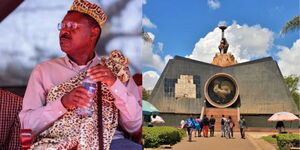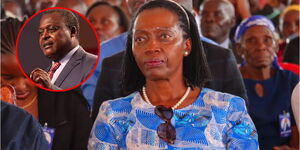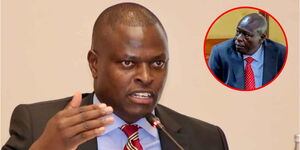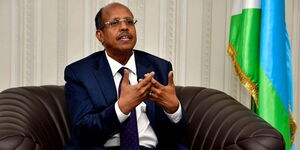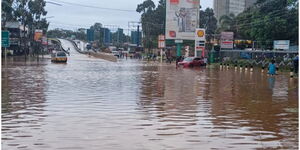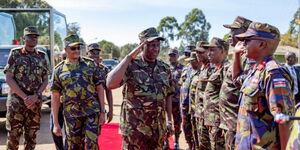President Uhuru Kenyatta on Wednesday, September 25, backed down on the long-standing feud between Kenya and Somali.
Reports by the Daily Nation indicated that this decision was reached after Uhuru met with Somali President Mohamed Farmaajo in the US.
The two heads of states agreed to normalise ties without any effect on the maritime border case at the International Court of Justice (ICJ).
This comes after the ICJ postponed the Kenya-Somalia maritime dispute case following an application by the Kenya government, which sought time to recruit a new defence team.
“I have the honour to inform you that the court has duly considered the request made by the Republic of Kenya on September 3, that hearings due to open on September 9, 2019, be postponed by 12 months, as well as the views expressed by the Federal Republic of Somalia in its letter dated September 4, 2019,” ICJ’s registrar Philippe Gautier wrote.
Past reports by the Daily Nation also reported that Gautier had stated that the ICJ would open public hearings for the case on November 4, not September 9 as had been earlier scheduled.
“In light of the circumstances and the possible alternative dates in its judicial calendar, the Court decided to grant a postponement of the oral proceedings in the case and rescheduled the oral hearings to the week beginning Monday 4 November 2019,” the registrar noted.
Somalia had filed the boundary delimitation dispute on August 28, 2014, staking a claim on an estimated 62,000 square miles oil-rich triangle in the Indian Ocean.
Somalia wanted the sea border extended along the land border, a plea which if granted threatened to limit Kenya’s access to its Indian Ocean shore, technically rendering the country landlocked.
The border dispute between the two countries also threatened to hamper efforts in the continuing construction of a border wall, the fight against piracy, as well as against Al Shabaab.
The border brawl resulted in several back and forths causing various ugly occurrences.
On May 12, 2019, the Kenyan Government suspended all direct flights from Somalia into the country citing security concerns.
Director of the KCAA, Captain Gilbert Kibe, affirmed to the BBC that visitors from Somali's capital Mogadishu or any other part of the war-torn country would no longer be able to fly directly to the Kenyan Capital.
Later on, the diplomatic row between the two countries took a nosedive after three top officials from the war-ravaged nation were denied entry at the Jomo Kenyatta International Airport (JKIA).
Reports from a popular Somalia Radio station, Dalsan FM, then disclosed that Somalia’s deputy minister of Water and Energy, Osman Libah, as well as Senators Ilyas Ali Hassan and Zamzam Dahir, were stranded at JKIA.
Somali took the row a notch higher by disclosing that Somalia dignitaries and representatives would no longer attend meetings scheduled to be held in Nairobi.
On June 11, 2019, the Government of Kenya ordered the closure of its border with Somalia in Lamu indefinitely citing security operations aimed at flushing out Al Shabaab militants suspected to be operating in the area.


